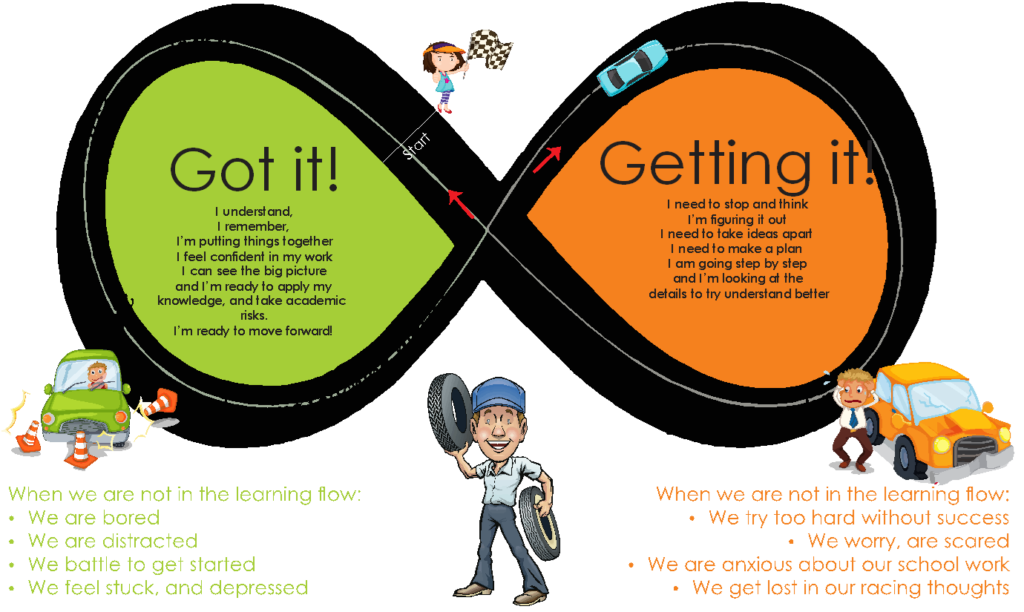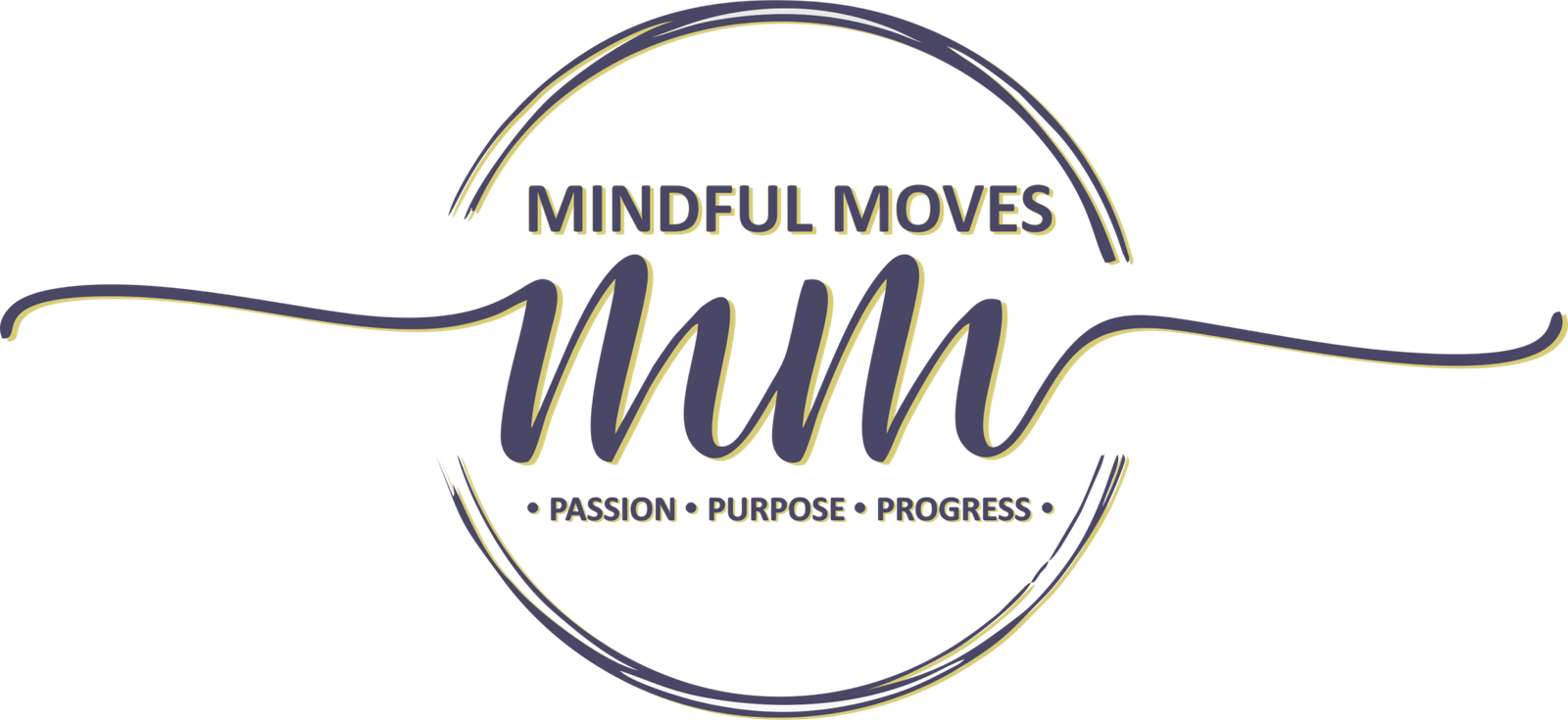
So have you just learned to tolerate operating under stress, not being able to do your best?
We are continually learning in life. Einstein has said, ” When you stop learning your start dying.” Life is about progress and becoming. In our work, we understand this in our Learning Flow model represented as a Lazy 8. Sometimes we on track… but other times we come off track.
What does “being on track” mean in our life?
Well when we are on track, we have enough physical, emotional and mental resources as well as the support needed to take the risk that is learning. Our prior knowledge and experience allow us to draw on what is known and has been learnt to navigate through new challenges which lead to growth.
Become aware of your thoughts, feelings and actions.
But we need to notice ourselves, our attitudes, thought process, level of patience and compassion, the words we use and the way in which we choose to engage or withdraw from our lives. We see that the “wheels coming off” appear as two different responses depending on our unique way in which we try to cope while stressed. These are referred to as the Stress-Based responses.

We might feel like we’ve “Lost It”!
When we feel overwhelmed, our emotions get the better of us. We feel hopeless and unable to move or to even get started. We withdraw from life and act in an avoiding manner. We become forgetful, (forgetting the details), we lose the ability to reason well, we may have trouble expressing our needs, act without thinking and appear frustrated and depressed. When we are overwhelmed in this way, we may see the following:
•appear inactive,
•can’t sustain attention,
•can’t get started,
•spaced out,
•too many choices, can’t choose,
•quits before finished,
•depressed; frustrated,
•confused, easily distracted,
•bored,
•fearful,
•”why me?”,
•speechless,
•unaware.
We might be experiencing the feeling of “I’m losing it”/ “I’m not getting it”!
We’ve often heard people expressing that they may are “losing it”. Such a person is driven by anxious energy as the try harder, with much effort and little or no results to show for the energy put in. When the wheels come off in this way, we try try even harder, become cold and push forward without feeling, we seem tense and mechanical, what we do is without full comprehension. Such people experience much worry, often lying awake at night, trying to solve their issues without success. When we are in this state, we may notice the following:
•micro-management,
•workaholic,
•can’t stop,
•worried,
•compulsive,
•perfectionistic,
•always ” up”,
•busy and “trying hard”,
•stressed,
•in denial,
•” it’s my fault”,
•automatic, inappropriate responses,
•painfully self conscious.
Children and young adults experience this too!
As adults, we often undermine our the feelings of children and young adults. School is tough and in previous consultations with schools, presenting this knowledge was a game changer as “naughty” learners who didn’t pay attention, were forgetful and spaced out, were shown to be completely overwhelmed, unable to move forward due to school stress and life stresses. For many such learners they were not given the support they needed and did not have the resources to get back on track themselves.

Noticing the signs of a person surviving rather than thriving.
Noticing is a skill we must develop when it comes to ourselves and our loved ones. But what are the signs of a person who is surviving rather than thriving? We must begin to become aware of a person’s;
- Use of words.
- Body language.
- Use of movement.
- How well they are thinking.
- How content they feel.
- The way in which they hold back.
- If their behaviour has changed.
- How forgetful they seem.
- Whether or not they seem to zone out.
- How motivated they seem.
- If they no longer enjoy doing the things they once did.
Notice the words you are using.
This is a good indication as to whether you are on track or not! You might lack motivation and energy and find yourself saying;
- ” I feel stuck”,
- ” I feel trapped”,
- ” I feel frustrated “,
- ” I’m depressed”.
Or you might be tightly wound and driven by anxious energy and are saying things like:
- ” My results don’t equal my effort”,
- ” I’m always trying so hard”,
- ” I’m anxious”,
- ” Working all the time”,
- ” Unable to keep up”,
- ” I’m Always behind”.
When you are using these words, you are not operating at an optimal level and you are unable to do your best. What if there is a way to be able to calmly do your best, so that no matter what, you can reach your full potential in all areas of your life?
Noticing Movement
We can notice movement in many ways. We observe the way in which a person chooses to engaged or withdraw from their environment. We watch how they move through their day. Body language, gestures and facial expressions, fill in the information that is “read between the lines”. Graphology is another study that considers the movement of the hand as a person writes to decipher their personality traits as well as their feelings and state of mind when writing.
The body is always giving away so much of what a person believes and feels.
Our English language is littered with saying that demonstrate the physical manifestation of a person’s emotions and mind state.
- To have ones head in the clouds.
- To be on loud nine.
- To feel down.
- Why the long face.
- Why the big lip.
- To have a stiff upper lip.
- To be sick to one’s stomach.
- To have a beat in one’s step.
- To have your feet on the ground.
Movement is Life
All things that are alive move and as you read this, you are breathing, your eyes are blinking, your heart is beating. Movement is taking place all the time, even as you sit still. When we are afraid, we tend to freeze and hold our breath. Sitting still or not being able to freely move results in the body and mind perceiving that it is in danger. Add to this the real stresses you are tolerating at present and it is no wonder that you may be feeling overwhelmed. When we can move and breath we feel safer and can think more clearly. Moving allows me to;
- move towards things I want,
- away to avoid dangers,
- sideways out of the way of things not meant of me,
- or back onto the path I meant to be one.

Moving allows us to access our gifted space.
Movement activates the brain. It also tells the body and mind that we are safe to be! When we are thriving and facing challenges as opposed to dealing with stress we see the following:
- We “get things” ,
- We draw on what we’ve learnt,
- We are working with things that are familiar,
- We respond without thought, using our natural gifts and talents,
- We move automatically,
- We understand the whole concept and move towards the details,
- We see the big picture,
- We feel good and we see the familiarity in context,
- We can think and move together,
- We are efficient,
- We are able to move forward,
- We feel safe.
From this place, we can take the necessary risks called learning.
- We also are getting new things (learning and growing),
- We are actively learning,
- We move into unfamiliar and new environments,
- We move with intentional movement,
- We understand the details and can put them into context,
- We might feel a bit uncomfortable as we work with the unfamiliar context… but we can cope,
- We can stop to think before moving forward,
- We may move a bit slower with thought, cautiously as we problem solve,
- and we may feel a bit self- conscious within reason as we regulate ourselves and learn from mistakes.
What happens when you ignore the signs.
Knowing how to notice if you are merely surviving or if you are indeed thriving, is important for any person. So many people go through life just existing. People being to tolerate high levels of stress and even and up convincing themselves that all they feel and the physical manifestations are “normal”. They end up living feeling exhausted, depressed and even in chronic pain all because they have not noticed the warning signs of the body and mind.
Notice signs within yourself.
You should be noticing these things for yourself. You have only one life and it is important that you look after yourself so that you will be there to support your loved ones for years to come. You owe it to yourself, your partner, children and colleagues to be the best you and to experience peak performance.
Notice signs within your children and learners.
As an adult or a person who can see the bigger picture, you should be able to notice these signs within your children or learners. Workshops and Courses can go a far way in supporting you as you develop such skills. For this reason, we are a SACE Service Provider and many of our courses created for parents and teachers offer CPTD points.
Book A Workshop or Course.
Let us support you so that you can learn more. Head over to www.mindfulmoves.co.za and check out our course page.
Experience a Balance.
Alternatively, book a balance session to experience for yourself the difference between thriving and surviving.

